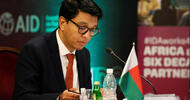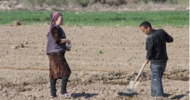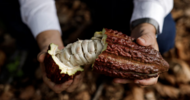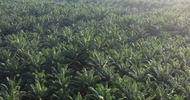Uganda still grapples with mass forced evictions being aided by international development financiers that are hosted and protected by big nations.
- Witness Radio
-
03 August 2021
The Silverlands I portfolio, the continent’s largest agricultural investment fund, includes primary production and beef and poultry assets across South Africa, Namibia, eSwatini, Zambia, Tanzania, Kenya, Uganda and Mozambique.
- HowWeMadeItInAfrica
-
07 April 2021
For farmers in Asia as elsewhere, land ownership and effective control is the key to any radical transformation of the food systems and for attempts to achieve genuine sustainable development to really matter.
But more than four years after signing a deal, five communities allege they were cheated. They say the company still owes them, and they demand retroactive payment.
- FrontPageAfrica
-
22 Mar 2021
Producers say their supply chains are green and sustainable, but prosecutors cite a long record of land grabbing, deforestation, pollution, and human rights violations.
Rural sociologist Saker El Nour discusses the complex power dynamics between main actors within land reclamation projects in Egypt.
- Mada Masr
-
02 February 2021
The co-founder of Microsoft and his wife rank as the largest private farmland owners in the US, with over 242,000 acres across the country.
- Land Report
-
18 January 2021
The industry boom in the demand for palm oil has come at the high price of rainforest destruction, labour exploitation, and brutal land and water grabbing. The pressure from oil palm plantations has pushed communities in West Borneo on a common struggle to access clean water and continue producing food.
- ECOTON, GEMAWAN, GRAIN, KRUHA
-
04 December 2020
SMTP created BoViMa in 2014 with the ambition of capturing the regional market, supplying beef to islands in the Western Indian Ocean. Its plans remained in cold storage for years. In 2017, the IFC stepped in.
A decade ago, the Indonesian government began to heavily promote large-scale plantation in southern Papua. An investigation recently published explored how some outside investors gained rights to the land and the fallout for the indigenous population. Children were suffering from malnutrition while agricultural commodities are exported from their ancestral land.
- The Gecko Project
-
14 July 2020
We naively believed that collaboration with farmland investor NCH Capital would be our opportunity for honest business in Ukraine. The complete opposite turned out to be true.
- Baltic Course
-
09 July 2020
Indonesia sits at the heart of the global palm oil trade. In 2002, one company PT Erasakti Wira Forestama (EWF) offered villagers in Batanghari, Jambi province a one-time payment for their land. Peatlands were converted to plantations — and the repercussions of the decision are still felt today.
Some villager
Letter from African community organisations to SOCFIN regarding the unsafe conditions for plantation workers and neighbouring communities during the current Covid-19 pandemic.
Dutch flower growers who dominate the flower farms in Kenya are being accused of avoiding taxation while proudly wearing the “fair trade” badge.
The Nasa of Colombia are carrying out direct actions in which they cut down cane fields, plant organic crops in their place, and allow the native vegetation to cover additional areas within the same reclaimed lands.
- Truthout
-
01 December 2019
The government’s plans to open up the land market are stirring fears that Ukraine’s coveted black earth will be bought up by foreigners, including Russians. Report from Associated Press.
The Dutch development bank FMO says its investments promote oil palm plantations in local communities. But the local communities are not welcoming these plantations. They want their land back.
Two Cambodian sugar farmers are bringing a case against Thai firm Mitr Phol claiming its subsidiary illegally cleared their land.
Member organisations of La Via Campesina in Africa, America, Europe, and Asia are confronted by changes in soil use and by landgrabbbing on a massive and alarming scale that is in direct contradiction with popular agrarian reform.
Groups call on UN Special Rapporteur to look into the recent spate of alleged cases of state-perpetrated harassment of peasants and indigenous peoples struggling for their right to land in her review of the human rights situation in Cambodia.
Decades-long legal battle over ancestral land had forced indigenous people to occupy other areas to make a living. Their loss of land has largely been driven by cattle, about 2.7 million people live in Mato Grosso do Sul, as do 22 million cattle, according to FAMASUL, a farmers' association in the state.
While large-scale soy growers say they’ve brought prosperity to the Cerrado, Campos Lindos has poverty levels far higher than the Brazilian average, lacks basic social services, and suffers high infant and maternal mortality rates.
Solange Bolembe of RIAO-RDC, an information and support network for community organisations in the DR Congo, explains the challenges that women face who live in communities affected by oil palm plantations.
Control of land for crops that sustain the world’s largest food businesses, such as Ferrero and Nestle, is the driving force behind the destruction of land affecting both environment and people worldwide.
- Globe Post
-
24 August 2018
Award-winning Cameroonian journalist Madeleine Ngeunga and Fern’s Indra Van Gisbergen recently visited villages in the shadow of Socapalm’s oil palm plantations to see if issues driving the dispute between locals and the company are being resolved.
Land prices have increased dramatically and despite a moratorium on foreign land purchasing, foreign entities have found a way to buy land. Polish farmers are despairing and protesting en masse.
The project leaders of Wanbao Africa Agriculture Development Limited seemed to have an emerging-market hubris every bit as blinding as that of their colonial predecessors.
The China-Pakistan Economic Corridor could see Chinese produce grown in Pakistan exported to Chinese markets, with little benefit whatsoever to Pakistan’s economy.
Contamination of water sources, deplorable working conditions, and sexual blackmail in exchange for work, are some of the kinds of violence against women living in and around oil palm plantations in Guatemala and Colombia.
Some commercial farmers in Zambia's have acquired thousands of hectares while ignoring laws meant to prevent forced evictions, writes Juliana Nnoko-Mewanu from Human Rights Watch















